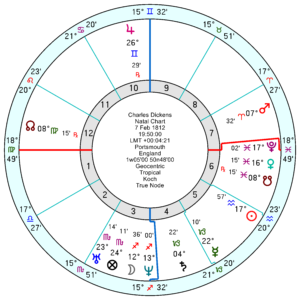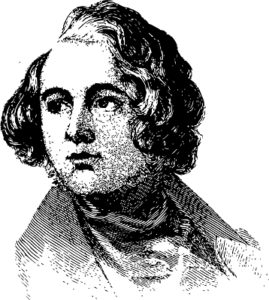Charles Dickens, renowned for his compassion for the poor, the suffering and the downtrodden, whose plight he exposed in his novels, appears to have been a good deal less saintly in his private life than his image suggested. Letters have emerged which tell the tale of how he tried to have his wife, mother of his ten children, committed to a mental asylum when she had lost her looks and he had started a long affair with an actress. The doctor in charge, a friend, refused to certify her and was called a ‘medical donkey’ by Dickens.
Born 7 February 1812 at 7.50pm Portsmouth, England, Dickens was sent to a blacking factory at 12 years old when he father was sent to debtors prison. Even after the father’s release he was left there. He became a legal clerk, then a writer who soared to great success in England and the USA.
He was a cerebral Sun in Aquarius on the cusp of the hard-working 6th house trine a successful Jupiter in Gemini in the 10th. Communicative Mercury, ruler of his 10th house of career, was in his entertaining 5th house. He had a bleak Saturn in Capricorn in his 4th house of childhood in a cruel-treatment square to feisty Mars in Aries in his 7th. He did have a hard childhood which in turn seems to have made him uncaring about his own children.
His Sun was square an independent, rebellious Uranus in the 3rd. His emotionally confused Moon Neptune was in square a passionate Venus Pluto in Pisces on the cusp of his 7th.
With intense controlling Pluto and argumentative Mars in his 7th house of relationships he was guaranteed to run into hostility in marriage. And his relationship chart with his wife Catherine was truly terrible with a composite Mars Pluto trine Uranus, sextile Saturn in their relationship chart – so volcanic quantities of anger, bitterness and resentment.
Catherine, 19 May 1815, was a stalwart Sun Taurus sextile/trine a pushily-confident Pluto opposition Jupiter with a volatile Mars square Uranus. Her Saturn was conjunct his Sun which is cold and critical. Certainly not someone to be tramped underfoot. She’d give as good as she got.
His mistress Ellen Ternan, 3 March 1839, didn’t look easy either since she was a Sun Uranus in Pisces square Saturn in Sagittarius so would be erratic and highly strung. But her Venus in Aries fell in his 7th conjunct his Mars which would help to smooth rough edges. Her Sun Uranus was conjunct his Venus Pluto which would be instant attraction but a fair amount of upheaval thereafter. Her Neptune was conjunct his Sun which isn’t ideal though can give a spiritual or self-sacrificial bond. Her Saturn was conjunct his Moon which can block out nurturing feelings – so he couldn’t quite escape his 4th house Saturn and his deprived childhood.



I read the Peter Ackroyd biography some years ago and my husband has read almost everything Dickens wrote. It’s true that CD never recovered from the deprivation of his childhood. I don’t think he and Catherine were ever well suited, though that in no way excuses his appalling behaviour towards her – he was restrictive and controlling according to his daughter, Kate. I notice the Neptunian moon and the secretive Venus/Pluto conjunction in Pisces on the descendant – I don’t think CD could cope with a real life woman who aged and changed through repeated pregnancies – the Neptunian/Piscean slant to his Venus and Moon, emphasised by a square between the two is problematic in that respect. Look at his sickly, saccharine, unbelievably virtuous young female characters.
Dickens met Ellen Ternan, her mother and older sisters in 1857 during rehearsals for a play by Wilkie Collins, appropriately entitled “The Frozen Deep” – a curious instance of synchronicity when one looks at CD’s transits at the time. CD had already grown cold towards his wife thoughout the course of the 50s and indeed, transiting Neptune had been moving back and forth over his Venus/Pluto conjunction throughout the decade. Saturn was in Cancer, opposing his theatrical fifth house Mercury when he met and fell in love with Nellie Turnan. Many of CDs friends attempted to persuade him against the relationship, but Dickens, blinded by love was determined, though Nellie never fell in love with CD – his love, in true Neptunian fashion was unrequited. Claire Tomalin’s “The Invisible Woman” is an excellent biography of Nellie btw.
I understand Tolstoy’s treatment of his wife was not much better. He wrote a novella The Kreutzer Sonata about a man murdering his wife which has long been suspected of being a form of literary wish fulfilment.
Dickens at least had the excuse of being a man made a hard by experience. I can never really warm to his books but my great grandmother by all accounts was a huge fan of his works. She was a Victorian so maybe she had a better understanding of the brutal world in which he grew up. Until the Lunacy Act came into force upper and middle class men could often resort to locking up wives in private asylums when they had got tired of them. I am not sure what relevance it has to the modern world though.
Gaslighting. The law has changed but for some husbands the ‘you’re-mad’ approach is all too present nowadays.
I read Tolstoy’s biography many years ago and from what I remember Tolstoy’s wife was very jealous of her husband’s easygoing relationships with his daughters and other young people, having tantrums and shouting, especially in later life. A jealous spouse can really poison a relationship.
He ended up leaving her at the very end so that he could die in peace, in a railway waiting room.